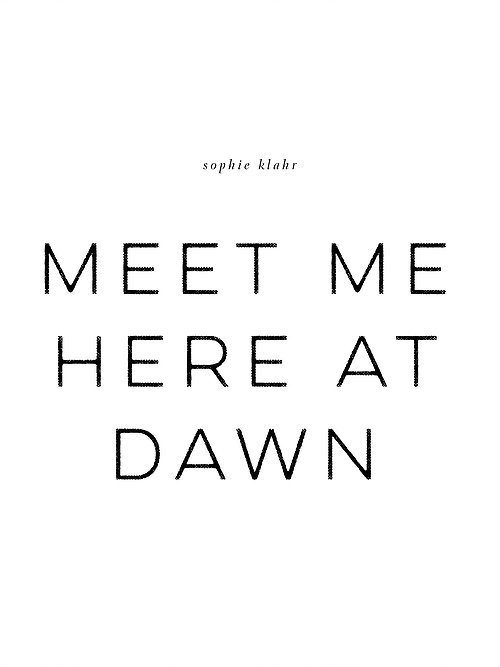After reading Sophie Klahr’s Meet Me Here at Dawn
by Rachel Mennies
[all text excerpted in the original book appears in italics]
an early poem named dare say when: its border learned only by crossing it
here Chicago New York Orlando Miami in each room only the speaker and her lover
I walk through the paid rooms (vols I/II/III) each full of pocket mints lotion matchbooks the paper bag of cash personal effects that, if left behind, successfully identify nobody
(here is never the lover’s wife I never see her face)
I greet the erotic with a hand in the dirt After sex sometimes, there is blood on the sheets the erotic with a hand in the air Night comes down / through the trees, cups my face / upwards— I pause in the dark where both sex and prayer begin with clasping fingers
To consider: I loved a hive of light
To consider: I came when he bit my palm
this book wishes me to pray how the speaker asks whose hand is whose how she lies beside another body disappears with your piece of God
and reappears in the unavoidable illumination of aftermath the sun rising through dawn blinds in each paid room light in the airport, trembling back
light on the brother whose life snapped back, a bough pulled down then released light on the father holding the speaker for the first time, a baby
(that is a mailbox he tells her that is a tree)
Klahr’s line expands and contracts from poem to poem a song hummed into different jars then unscrewed
after leaving the paid rooms for good the speaker trades rhetorical positioning if morality has a fiber to it could it heal itself? for the windows opening wide it is the fifth year of our affair for the lights turned on what have we brought forth?
across its brightened threshold she brings a bride wading into a pool
I never see her face
I look away the first time I read the word wife as if I’d walked uninvited into the poem (a bedroom with the door ajar) I’ve been trying not to mention your marriage but they say a gun onstage must go off
each time after I do not look away
I set out to review Meet Me Here at Dawn in a more traditional format and, as I do with any book I'm (re)reading with the intention of reviewing, I took weird, shorthanded notes in the margins. As I read Klahr's book—in particular, as the speaker's important troubling of the boundaries between intimacy, eroticism, and loss grabbed me—I looked over my notes and realized they'd crystallized into a sort of poem themselves. I offer up this creative response, based partly on those margin notes, entirely at the altar of the original book: a rendering done in gratitude for having read it.
Rachel Mennies is the author of The Glad Hand of God Points Backwards, the 2014 winner of the Walt McDonald First-Book Prize in Poetry and finalist for a National Jewish Book Award, and the chapbook No Silence in the Fields. She teaches writing at Carnegie Mellon University and is a member of AGNI’s editorial staff.

